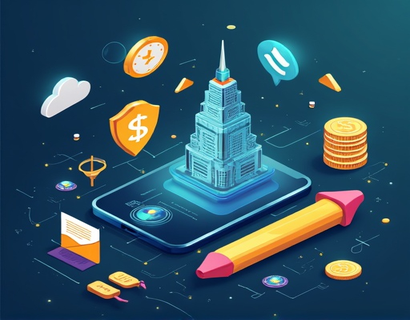Unlocking Digital Growth: Harnessing AI and Crypto for Next-Gen Ucosystem App Solutions
The digital landscape is undergoing a profound transformation, driven by the convergence of artificial intelligence (AI) and cryptocurrency technologies. This synergy is not just a trend but a fundamental shift in how we design, interact with, and monetize digital applications. For tech enthusiasts and professionals alike, understanding the potential of AI and crypto in app ecosystems is crucial for unlocking new avenues of growth and engagement. This article explores the latest innovations at the intersection of these technologies, highlighting how they are redefining user experiences and setting new standards for digital innovation.
The integration of AI into app ecosystems has revolutionized user interactions. AI-driven personalization ensures that each user's experience is tailored to their preferences and behaviors. By analyzing vast amounts of data, AI algorithms can predict user needs, recommend content, and optimize app functionalities in real-time. This level of personalization not only enhances user satisfaction but also increases retention rates and engagement. For instance, AI-powered chatbots provide instant customer support, resolving queries and issues efficiently, thereby improving the overall user journey.
Cryptocurrency, on the other hand, introduces a new paradigm for app monetization and user incentives. Traditional app revenue models often rely on advertising, subscriptions, or in-app purchases, which can be intrusive and disrupt user experiences. Cryptocurrency offers a decentralized and transparent alternative, enabling seamless transactions and rewarding users for their engagement. Token-based systems can incentivize users to contribute content, participate in community governance, or complete specific tasks, fostering a more active and loyal user base.
One of the most significant advantages of combining AI and crypto in app ecosystems is the creation of decentralized applications (dApps). dApps leverage blockchain technology to ensure transparency, security, and user control over data. AI enhances these applications by providing intelligent services that adapt to user behavior and preferences. For example, a decentralized social media platform can use AI to curate content based on user interests while ensuring that data remains under the user's control. This combination not only enhances privacy but also builds trust, a critical factor in user adoption.
The development of smart contracts further exemplifies the synergy between AI and crypto. Smart contracts are self-executing contracts with the terms directly written into code. When combined with AI, these contracts can automate complex processes, such as content moderation, fraud detection, and automated payments. AI algorithms can analyze patterns and anomalies in real-time, triggering smart contract actions to maintain the integrity and security of the app ecosystem. This automation reduces manual intervention, lowers costs, and increases efficiency.
Another area where AI and crypto are making waves is in data ownership and monetization. Traditionally, users have little control over their data, which is often exploited by centralized entities for profit. Blockchain and AI can empower users by giving them ownership and control over their data. Through tokenization, users can monetize their data by selling access to it to relevant parties, such as research institutions or marketing firms. AI can help match data providers with potential buyers based on data relevance and value, creating a robust and fair data economy.
The financial aspects of integrating AI and crypto in app ecosystems are equally compelling. Cryptocurrencies offer a seamless and borderless payment system, eliminating the need for intermediaries and reducing transaction costs. This is particularly beneficial for global apps that cater to a diverse user base. AI can optimize payment processes by predicting transaction patterns, managing risks, and ensuring compliance with regulatory requirements. For developers, this means lower operational costs and the ability to focus on innovation rather than financial logistics.
In terms of user engagement, AI and crypto can create unique and rewarding experiences. Gamification, powered by AI, can make app usage more enjoyable and interactive. By analyzing user behavior, AI can design personalized challenges, rewards, and progress tracking systems that keep users engaged. Cryptocurrency can enhance these experiences by offering in-app tokens or cryptocurrencies as rewards, which users can use within the app or exchange for real-world value. This dual approach not only boosts engagement but also builds a community around the app.
The educational potential of AI and crypto in app ecosystems should not be overlooked. These technologies can provide users with valuable insights and learning opportunities. For instance, AI-driven tutorials can adapt to a user's learning pace and style, offering personalized guidance in complex topics such as blockchain, cryptography, and AI algorithms. Cryptocurrency can facilitate micro-transactions for premium content or access to advanced features, creating a sustainable model for educational apps.
From a development perspective, the tools and frameworks supporting AI and crypto integration are rapidly advancing. Libraries like TensorFlow and PyTorch simplify the implementation of AI algorithms, while platforms like Ethereum and Binance Smart Chain provide robust infrastructure for building dApps. These tools lower the barrier to entry for developers, enabling more innovative solutions to emerge. Additionally, the growing ecosystem of developers and experts in AI and crypto ensures continuous improvement and support for these technologies.
However, the integration of AI and crypto in app ecosystems is not without challenges. Privacy and security remain top concerns, as the handling of sensitive data requires stringent measures. Compliance with regulations such as GDPR and CCPA is essential to avoid legal repercussions and maintain user trust. Developers must implement robust security protocols and transparent data management practices to address these issues effectively.
Another challenge is the technical complexity involved in combining AI and crypto. Developers need a solid understanding of both domains to create seamless and efficient applications. Continuous learning and staying updated with the latest advancements are crucial. Collaboration between AI and crypto experts can help overcome these challenges, fostering a more cohesive and innovative approach to app development.
The future of app ecosystems lies in the harmonious integration of AI and crypto technologies. As these innovations continue to mature, we can expect to see more sophisticated and user-centric applications. The potential for creating immersive, secure, and rewarding digital experiences is immense. For tech professionals and enthusiasts, embracing this convergence is key to staying ahead in the rapidly evolving digital landscape.
In conclusion, the combination of AI and crypto is transforming app ecosystems in profound ways. From enhancing user interactions and monetization to enabling decentralized and educational applications, the possibilities are vast. By leveraging these advanced technologies, developers can create next-generation solutions that not only meet current demands but also anticipate future needs. The journey ahead is exciting, and those who harness the power of AI and crypto will be at the forefront of digital innovation.










































